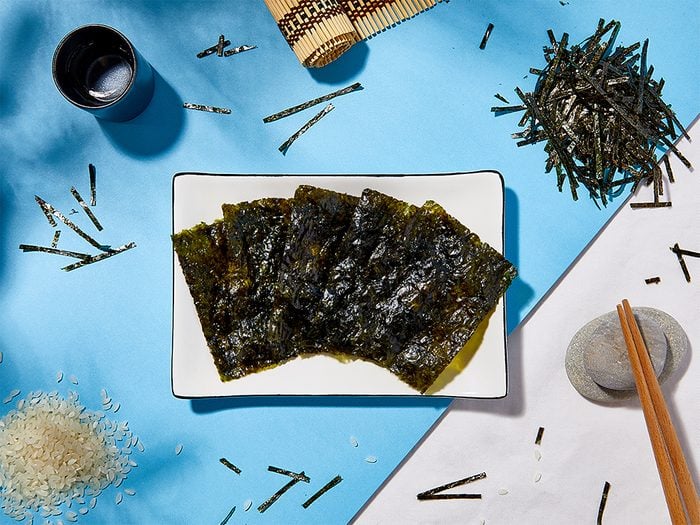Why Vegetarians May Want to Add Nori to Their Diet

This Japanese dried seaweed is made of algae — making it an ultra nutritious superfood.
Our editors and experts handpick every product we feature. We may earn a commission from your purchases.
Nori is the Japanese word for dried edible seaweed, and it’s been consumed for thousands of years. Nori was eaten as a thick paste until the 1700s, when the Japanese developed a way to dry it in sheets, applying the same method they used to make writing paper.
Today, nori is made from strands of edible red algae that are shredded, pressed into ultra-thin sheets and then dried and toasted. Baking at a low temperature dehydrates the seaweed, while roasting enhances its briny flavour. The best algae for making nori grows in cold, nitrogen-rich water and is cultivated in both the northern and southern hemispheres.
Nori is often associated with Japanese cuisine, but it’s also long been a popular item in Scotland, where the unpolluted, cool waters along the coast offer ideal growing conditions. The Scottish regularly use the mineral-rich seaweed as fertilizer but have also traditionally included it in their diet in dishes like oatmeal.
(Related: Chlorella vs. Spirulina: Which One Is Right for You?)
Why it’s good for you
The algae used to make nori is a true superfood. Algae contains up to 50 percent protein by dry weight and all nine amino acids, which puts it on par with other vegetarian protein sources like tofu and eggs. Why is this sea plant so protein-packed? It’s all thanks to photosynthesis, the process by which algae converts sunlight into energy. This ability to produce its own food, coupled with algae’s naturally high growth rate, generates more protein than other plants.
Seaweed is also often touted for its high mineral content, which is 10 times greater than that of plants grown in soil. This is due to the large concentration of minerals in seawater, which makes dried nori a good source of micronutrients like vitamins A and C, iron and iodine. Iodine is a mineral that’s important for a well-functioning thyroid, a gland responsible for regulating metabolism, and reduced levels can lead to hypothyroidism. Maintaining healthy iodine levels has also been shown to stimulate immunity and may help mitigate symptoms of fibrocystic breast disease.
Ever wonder where fatty fish, like salmon, get their omega-3 content from? It turns out the origin is their algae-heavy diet. Nori is a source of polyunsaturated fatty acids, such as DHA and EPA, two important fatty acids the body is not able to produce itself. Polyunsaturated fatty acids from algae are well-absorbed by humans and are cardioprotective, helping to lower blood lipids and improve cholesterol levels.
(Related: Should You be Drinking Chlorophyll Water?)
How to use it
Another great thing about nori is that it’s readily available in most grocery stores, in the international aisle. When buying nori, look for sheets that are dark green, smooth and uniform in texture, and avoid those with splotches or a reddish tint. Try Eden Foods Toasted Nori Sheets ($10, houseofwellness.ca). You can also find smaller sheets in snack-size packages for a quick salty bite.
To keep nori in top form, store it in airtight packaging, and if you won’t get to it within two weeks, pop it in the freezer, where it’ll maintain its freshness for about six months.
You may not be up for rolling your own sushi, but there are many equally delicious ways to use nori that require less time and effort. Nori imparts dishes with the same savoury flavour as bacon or anchovies, courtesy of one of the amino acids it contains: glutamate, the same compound used in MSG. Harness that umami in your cooking by incorporating nori into seasonings, dips and noodle dishes or using it as a garnish for soups and stir-fries. In Japan, ground-up nori is made into an all-purpose topper called furikake, a blend of seaweed, sesame seeds and other seasonings that’s excellent sprinkled on rice and eggs.
Now that you know the health benefits of nori, this is what you need to know about romanesco.




